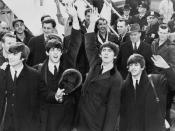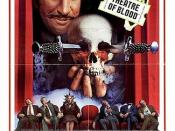England Swings, Right into an Open Grave.
An analysis of Theatre of BloodÃÂs Depiction of British National Identity.
There are many difficulties encountered when attempting to define the creative validity of BritainÃÂs filmmaking industry according to the parameters associated with the term ÃÂNational CinemaÃÂ. Many such dilemmas arise out of the British tendency to utilize creative tradition as a weapon against cultural attrition. Despite obvious language similarities, Hollywood filmmaking, and that of its British counterpart, remained highly independent identities up until the early 1960s. Ingrained in BritainÃÂs filmic productions, were a variety of heritages both literary and cinematic in tradition. Constantly in fear of a loss of identity attributed to an ever growing influx of American influences, Britain initiated a staunch quota system. This initiative created a great number of works which were reflective of the countriesÃÂ rich heritages. Many of these films were reflective of a unique stylistic approach derived from the sparse black and white documentary aesthetic of government documentaries produced by John Grierson.
This definition of national identity served for the inspiration behind such notable films as David LeanÃÂs adaptation of Charles DickenÃÂs Great Expectations (1946) and Oliver Twist (1948), Laurence OlivierÃÂs interpretation of William ShakespeareÃÂs Hamlet (1948), and the bleak seriousness of Brief Encounter (David Lean, 1945), as well as the Michael Powell and Emeric Pressburger directorial partnership. Despite their inherent stagnancy, these ÃÂClassicÃÂ works adhered greatly to a centuriesÃÂ old definition of ÃÂBritishnessÃÂ, refined, intelligent, and rooted in literary nostalgia. In the shadow of these objects of prestige, were a variety of ÃÂQuota QuickiesÃÂ, genre films which were not considered great works of art, but rather a means to ensure that audiences were inundated with national productions amidst a threat of American cultural invasion. This widespread paranoia was rooted in the belief that America...


